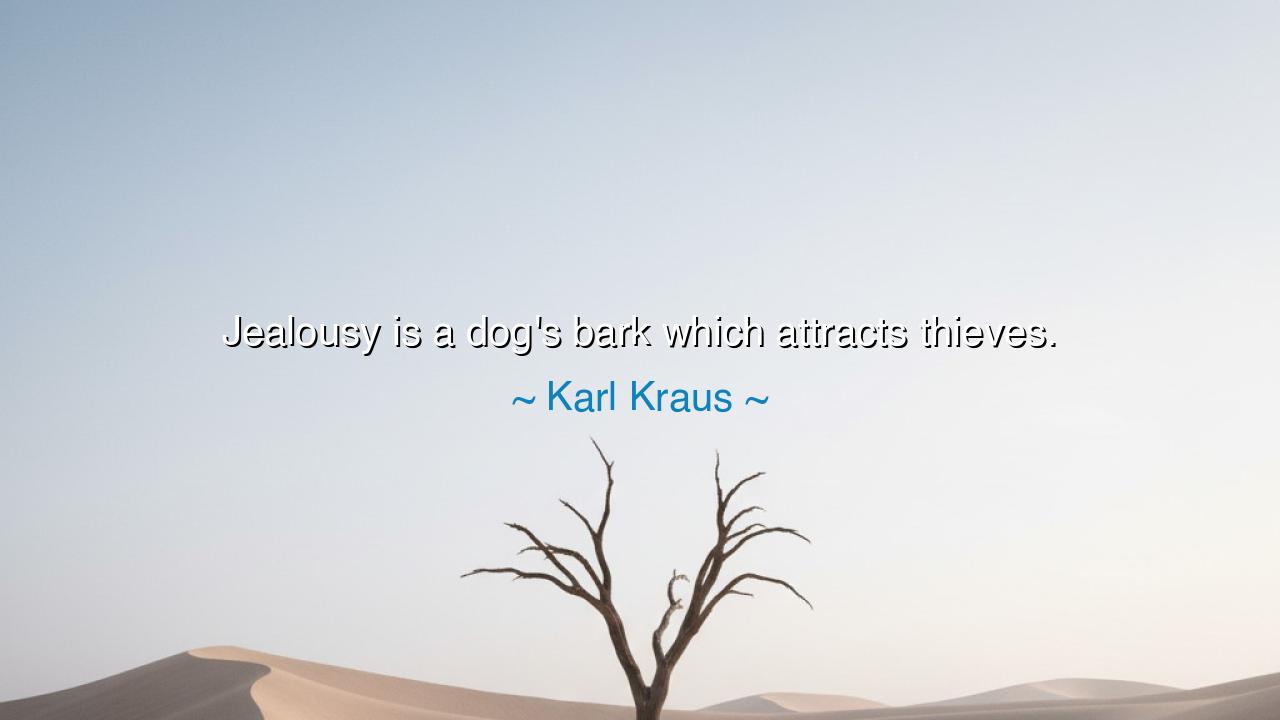
Jealousy is a dog's bark which attracts thieves.






“Jealousy is a dog’s bark which attracts thieves.” Thus wrote Karl Kraus, the fierce Austrian satirist, whose pen struck like lightning upon the hypocrisy of human passions. In this brief and cutting line, he reveals the paradox of jealousy — that it seeks to protect love, yet invites its own destruction. Like a foolish guard dog, jealousy barks at every shadow, drawing the attention of those who would otherwise pass by. In its desperation to defend what it cherishes, it exposes its weakness and calls forth the very danger it fears. The jealous heart, loud in its insecurity, becomes its own undoing.
Kraus lived in the age of the crumbling Austro-Hungarian Empire, an age of masks and mirrors, of moral pretenses and hidden desires. He saw jealousy not merely as a private torment, but as a symbol of all human folly — the habit of making noise when silence would preserve peace, of revealing our fears when secrecy would keep us safe. In love, as in life, jealousy is often born from pride and fear, not truth. It is the bark of mistrust, the cry of self-doubt. And like the dog that cannot tell friend from foe, the jealous person bites even the hand that would caress them.
The image of the barking dog is perfect, for jealousy is both loyal and foolish. It seeks to guard what it loves, yet in guarding it too loudly, it alerts the world to its owner’s insecurity. How many hearts have been lost because one could not trust in silence? How many relationships have fallen apart because suspicion spoke too soon? The jealous person imagines they are defending love, but in truth they are announcing to the world, “Here lies treasure — and I fear it will be stolen.” Thus, their very fear becomes prophecy, and what they dread comes to pass.
Consider the story of King Henry VIII and Anne Boleyn — a tale written in blood and pride. Henry’s jealousy, like a restless hound, turned against the very woman he once adored. He feared her independence, her wit, her ability to command attention. His mistrust grew louder than his love, and in his rage, he condemned her to death. Yet what did his barking achieve? The kingdom whispered, foreign courts mocked him, and the love he sought to preserve was lost forever. In his attempt to guard his pride, Henry invited disgrace — the thief that jealousy itself had summoned.
Karl Kraus understood this deeper law of life: that what we fear losing, we often drive away by clinging too tightly. Jealousy, in its nature, is self-defeating. It declares, “I do not trust what I possess,” and in doing so, poisons the very bond it would protect. The jealous lover watches with suspicion, speaks with bitterness, and loves with fear. Each act, meant to preserve affection, corrodes it instead. For love thrives in freedom, but dies in captivity. And so, Kraus warns — the louder you bark, the sooner the thieves will come, for even the noblest heart cannot long endure constant suspicion.
But this truth extends beyond love. Nations, too, have fallen to the same folly. When an empire grows jealous of its rivals, when it shouts its power to prove its might, it reveals its weakness. The proud dog of history has often barked too loudly, drawing the attention of those who would conquer it. The ancient Romans, once serene in their confidence, grew paranoid of enemies and tore themselves apart from within. Jealousy, whether of love or of power, always summons the thief — for fear is the scent of opportunity.
So, my listener, take this lesson deeply to heart: when jealousy stirs within you, do not let it bark. Guard your heart in silence; trust in the strength of what is real. If love is true, it needs no defense; if it is false, no defense will save it. Remember that the loudest fear is the easiest to exploit, and the calmest confidence is the hardest to break. Be as the wise keeper who watches quietly in the night — seeing all, fearing none, trusting in the walls of truth and faith.
Thus, Karl Kraus reminds us: jealousy is not a sign of devotion, but of doubt. The one who truly loves need not bark to prove their loyalty. Keep your heart still, your faith strong, and your spirit humble. For silence born of trust guards better than noise born of fear — and in that peace, no thief will ever find their way in.






AAdministratorAdministrator
Welcome, honored guests. Please leave a comment, we will respond soon